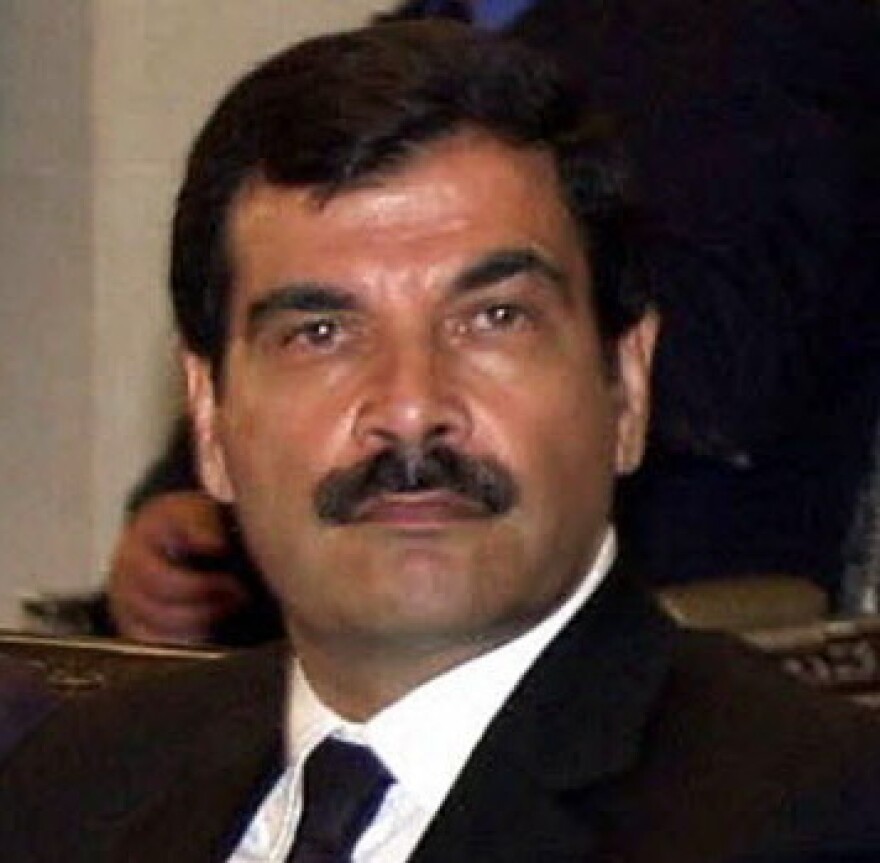The uprising in Syria against the regime of President Bashar Assad took a dramatic turn today when an explosion at a government building in Damascus killed the country's defense minister and a brother-in-law of the president.
Syrian state TV, which is reporting the deaths, has blamed a suicide bomber. There have been at least two claims of responsiblity from groups opposed to the Assad regime. There are also reports that the bomber was a member of the Assad inner circle's security team.
After first announcing the death of Defense Minister Gen. Dawoud Rajha, state TV followed around 7:30 a.m. ET with word that Deputy Defense Minister Gen. Assef Shawkat, the husband of Assad's elder sister, also died.

The Guardian reports that Syrian activist Shakeeb al-Jabri, who posts messages on Twitter as @LeShaque, warns there will be a "massive retaliation" from the Assad regime.
We're updating this post as the story develops.
Update at 11:50 a.m. ET. A Strike At The "Military Structure":
"The attack in Damascus, after three days of fighting in the capital, hit at the very military structure that has been directing the harsh repression of the 17-month-old uprising against Mr. Assad's rule," The New York Times writes.
Update at 11:30 a.m. ET. Live Video:
Al-Jazeera is streaming what it says are live video feeds from inside Syria that show some of the fighting now underway.
Update at 11 a.m. ET. State TV Says Third General Was Killed:
Following up on earlier reports that former defense minister Gen. Hassan Turkmani was also killed, al-Jazeera writes that Syrian state TV says he indeed has "died of wounds sustained in a bomb attack."
Update at 9:30 a.m. ET. Syria May Be "Spinning Out Of Control":
At the Pentagon this morning, Defense Secretary Leon Panetta said the situation in Syria may be "rapidly spinning out of control," the AP reports.
Meanwhile, Reuters is reporting that former defense minister Gen. Hassan Turkmani, who is now an assistant vice president, was also killed.
Update at 8:50 a.m. ET. Shawkat Was "Chief Architect" Of Crackdown:
According to the Guardian, Gen. Shawkat was "the chief architect of the 16-month crackdown" by the Assad regime on those who have been protesting and the militias that have been battling government forces. And, the Guardian says:
"Shawkat, married to Assad's sister Bushra, was one of the most feared figures in the president's inner circle and had won the support of the clan's influential matriarch, Anisa. He was one of three central figures in the regime crackdown, along with Assad himself and his brother Maher. As Syria's overall security chief, he had key input into all military and intelligence operations. He is known to have survived an attempt to poison him in late May when a cook contaminated food that had been prepared for him and key members of the national security ministry."
Our original post, "Syrian Defense Minister Killed In Explosion, State TV Says":
Syria's defense minister was killed today in an explosion at a government building in Damascus, state media there are reporting.
Correspondent Rasha Elass tells our Newscast Desk that Syrian state TV claims a suicide bomber targeted a government building. This comes as clashes in Damascus have escalated and the uprising against President Bashar Assad's regime may have reached a tipping point.
According to The Associated Press, the explosion happened "during a meeting of Cabinet ministers and senior security officials." Along with Defense Minister Gen. Dawoud Rajha's death, state media are reporting that other senior officials were wounded, the wire service adds. The BBC says that among those reportedly injured was a brother-in-law of Assad.
Activists in Syria, Rasha reports, say today's apparent attack marks the greatest breach of security against the Syrian regime yet. According to the BBC, "security sources say the suspected bomber worked as a bodyguard for members of President Bashar Assad's inner circle."
Meanwhile, as the AP writes, "the U.N. Security Council was scheduled to vote later Wednesday on a new resolution aimed at pressuring the Syrian regime to comply with a peace plan. But Russia remained at loggerheads with the U.S. and its European allies over any mention of sanctions and Chapter 7 of the U.N. charter, which could eventually allow the use of force to end the conflict in Syria."
We'll update with more on the news as the story develops.
Copyright 2021 NPR. To see more, visit https://www.npr.org.



